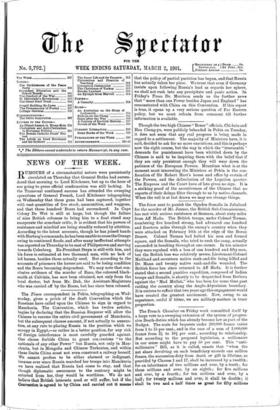The Times correspondent in Pekin, telegraphing on Wed- nesday, gives
a precis of the draft Convention which the Russians have called upon the Chinese to sign in regard to Manchuria. The Convention, which has twelve articles, begins by declaring that the Russian Emperor will allow the Chinese to resume the entire civil government of Manchuria, but the subsequent clauses amount, if not actually to annexa- tion, at any rate to placing Russia in the position which we occupy in Egypt,—or rather in a better position, for any risk of foreign interference is most carefully guarded against. One clause forbids China to grant corscessions "to the nationals of any other Power" but Russia, not only in Man- churia, but in Mongolia and Chinese Turkestan, and within these limits China must not even construct a railway herself. We cannot profess to be either alarmed or indignant, because ever since Russia marched her troops into Manchuria we have realised that -Russia had come to stay, and that though diplomatic assurances to the contrary might be extorted from her, they would be worthless. We do not believe that British interests need or will suffer, but if the Conv don is agreed to by China and carried Out it means that the policy of partial partition has begun, and that Russia has actually taken her piece. We trust that even if Germany insists upon following Russia's lead as regards her sphere, we shall not rush into any precipitate and panic action. In Friday's Times Dr. Morrison sends us the further news that "more than one Power besides Japan and England" has remonstrated with China on this Convention. If this report is true, it opens up a very serious question of Far Eastern policy, but we must refrain from comment till further information is available.






































